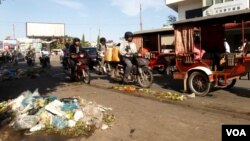Many years ago, banana or lotus leaves were used to wrap up snacks and other goods. These days, it’s plastic bags.
The country is littered with them. Increasingly, Cambodians are beginning to worry about their impact on human health and the environment. Yet there’s a long way to go to get rid of them.
Ear Phun, a vendor at O’Russei Market, in Phnom Penh, said he sells between 50 kilograms and 200 kilograms of plastic bags every day. “The number of lotus leaves cannot meet the demand of the population, which is rising every day,” he said. “So we can’t avoid using plastic bags, even though we know they are harmful to the environment.”
Hul Seingheng, director of research at the Institute of Technology, said plastic bags are made up of potentially harmful chemicals. Some of them are carcinogens, which can affect reproductive health in women, including fetal development, he said.
Plastic bags can also be dangerous to aquatic wildlife, which swallow them, he said. And, if plastic is left in the ground for a log time, chemical “leaching” occurs.
For all their dangers, there are no specific numbers on how many plastic bags are used in Cambodia.
Sao Sopheab, a spokesman for the Ministry of Environment, said Phnom Penh produces 2,000 tons of solid waste per day, and as much as 20 percent of that is plastic bags. “We can’t ban people and sellers from using plastic bags, because it is an easy way for packing and is used almost all the time,” he said. “The biggest concern is to educate users and sellers to understand more about keeping waste after use.”
Heng Yon Kora, a program director for community sanitation and recycling, said people use plastic bags because they don’t understand their impact, and because they are cheap. “If the price of plastic bags increases, perhaps there will be less purchases,” he said.
At an event called “Vital Go Green” last week, Environment Minister Say Sam Al, said that the government is working to encourage private companies to reduce the use of plastic in Cambodia. That includes possible tax incentives for greener companies, he said.
For a seller like Ear Phun, knowing the impact of plastic is no help, because no alternatives are available. “It will be more than 100 years before the plastic melts,” he said. “But there is nothing to replace it.”
Plastic Bags Remain Major Source of Litter
- Ouch Nida
- VOA Khmer

A Cambodian researcher says plastic bags are made up of potentially harmful chemicals, which can affect reproductive health in women, including fetal development.
PHNOM PENH —





